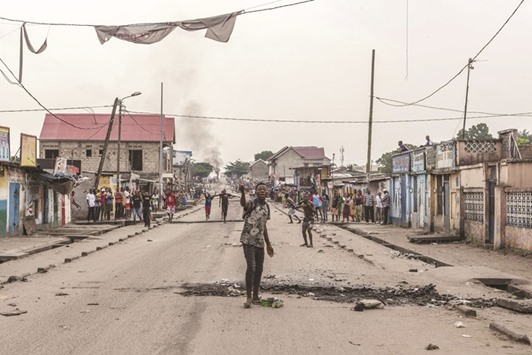Security forces arrested 275 people and 21 died during protests demanding that President Joseph Kabila step down, police said yesterday, although counts by rights groups suggested a higher death toll.
Figures on the numbers of dead, wounded and arrested trickled out as anti-Kabila protests that began in the early hours of Tuesday appeared to be dying down.
Earlier in the day sporadic gunfire echoed across the capital Kinshasa, and security forces repressed a protest in the southeastern mining hub of Lubumbashi, leaving 10 dead and 47 wounded in two days of clashes, King Kasongo, a lawyer and activist for the NGO Humanism and Human Rights (HDH), said.
Mobs also wounded a policeman and attacked government offices, health centres and gas stations, he said.
African and Western leaders fear the political crisis could spiral into broader conflict, risking a repeat of the 1996-2003 wars in this vast, chaotic country that killed millions and drew in the armies of half a dozen neighbouring states.
Human Rights Watch (HRW) earlier said that at least 26 people were killed across Congo, including one in Lubumbashi, though it had yet to provide a final tally, while the director of the United Nations human rights office in Congo Jose Maria Aranaz said he had confirmed 19 deaths with 45 wounded.
Police spokesman colonel Pierre Mwanamputu put the nationwide death toll lower, at 21 civilians and one police officer. He said many civilians were either looting or hit by stray bullets.
Two-hundred-seventy-five had been arrested, he said, of whom 116 were still being detained. “The heavy security presence will remain in place until the end of the year,” he added.
Protests erupted moments after the expiry of Kabila’s mandate cast the nation of 70mn into the constitutional unknown. Young men started fires in the streets of Kinshasa and threw stones at riot police.
Elections to choose a successor were delayed from November this year to mid-2018, with the government citing problems registering millions of voters.
As an uneasy calm returned, some Kinshasa residents ventured from their homes yesterday, but the city’s normally hectic traffic had slowed and buses were limited.
Authorities arrested 20 members of the activist group LUCHA yesterday for sitting in front of the office of the governor of North Kivu province in the city of Goma, the group said on Twitter.
Democratic Republic of Congo, Africa’s biggest miner of copper and metals used in gadgets such as cobalt, has not known a peaceful transition of power since independence from Belgium in 1960.
Armed groups have repeatedly clashed over Congo’s land and mineral wealth and used mass rape as a strategic weapon.
The main opposition bloc showed up to the resumption of talks mediated by Congo’s Roman Catholic bishops, but Jean Marc Kabund, the leader of one of the parties in the bloc, the UDPS, told reporters he was only there to insist on Kabila quitting.
The church has assumed the responsibility of trying to prevent the crisis spinning out of control.

People protest in the neighbourhood of Yolo in Kinshasa.
